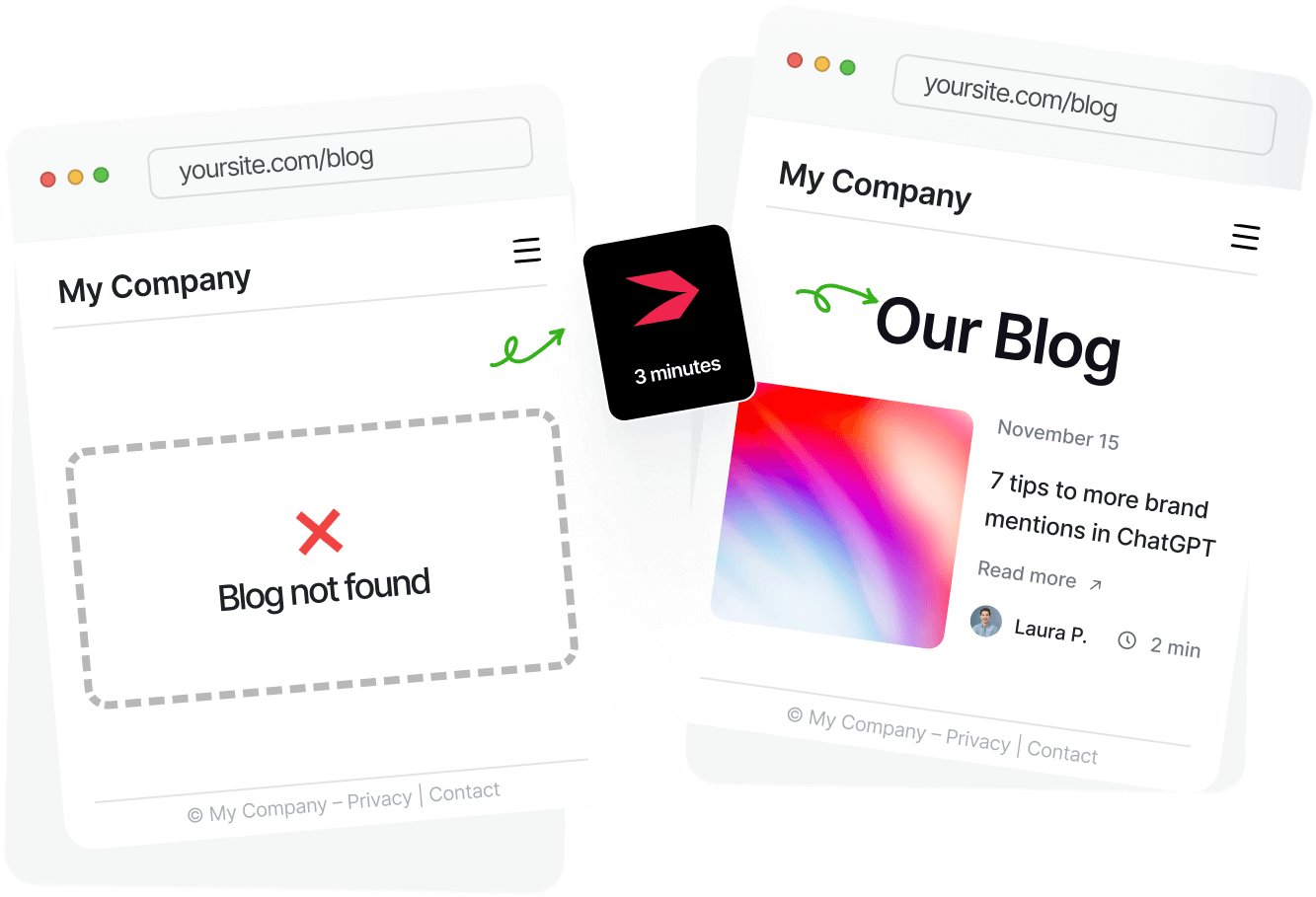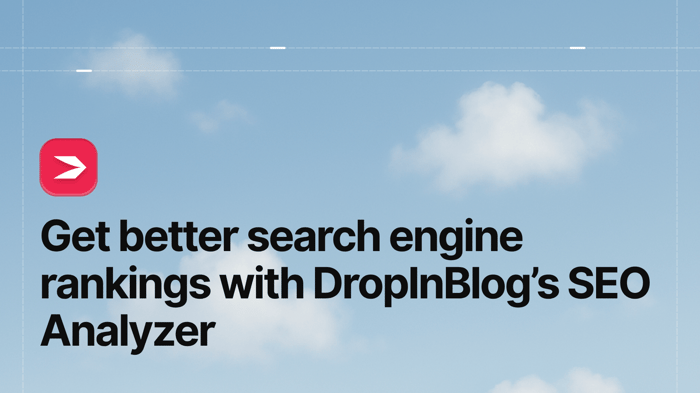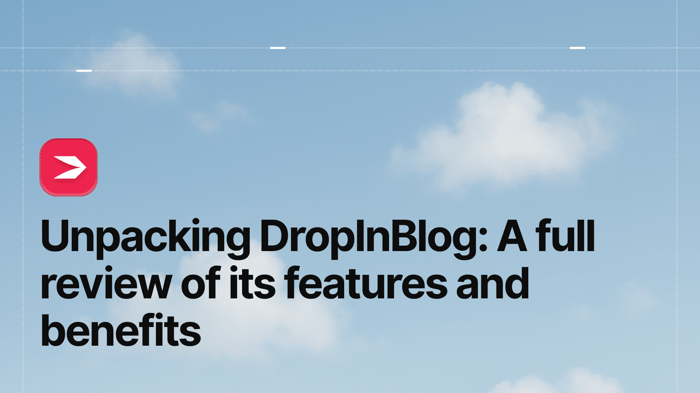Blogging has come to be known as a very efficient marketing tool for businesses. You might be wondering how and why blogging is so important for business. It all comes down to visibility – if you start a blog for your business, you'll become more visible online. And that increases your chances of making a sale.
Table of Contents
It’s Good for SEO
We’ll break it down a little more. Blogging can help you to increase organic traffic to your website. Organic traffic converts better and is far cheaper than running an ad campaign.
Similarly, blogging is good for SEO and offers an opportunity to build internal links between your pages. The more internal links networking your site and the more pages you have only help search engines to index your website and, in turn, place you higher on SERPs.
It’s a Relationship Building Tool
Of course, blogging is also more than SEO – it can help you build a relationship with customers by highlighting you as an expert in your niche and connecting on a similar wavelength. Another major bonus if you start a blog for your business is that you can utilize it to grow an email list. You can then use the email list for marketing purposes or to unveil special offers to your loyal customer base.
If you get this all right and make your blog effective, you’ll likely see an increase in conversions – which is often the ultimate goal for a business. So, how can you start a blog the right way to ensure you reap all the rewards?
A Step-By-Step Guide to Starting a Blog for Your Business
Lay the Groundwork: Planning
Starting a blog for your business requires more than a little forethought, and using a checklist can be really helpful. Firstly, you need to establish what the focus of your blog will be and what your goals are.
Are you simply aiming to grow your email list for marketing purposes, or do you want your blog to boost SEO? Perhaps both? Your blogging goals will determine how you develop your content strategy.
Everything from this point will always come back to the content strategy you devise.
Choose a Platform
There are many blogging platforms to choose from, including hosted and self-hosted options. While I’m not going into the specifics of each platform, I can say that they vary significantly in terms of features, functionality, and price. Some of the wildly different platforms out there include Bubble, Squarespace, and Wix.
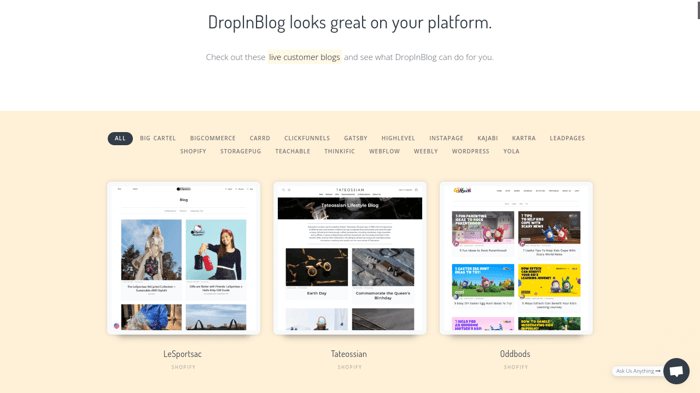
The questions you need to ask yourself before choosing a blogging platform are:
- How much time do I have to work on the blog?
If you’re strapped for time, then you’ll benefit from a professional blogging platform that makes posting SEO-optimized content fast and easy, like DropInBlog.
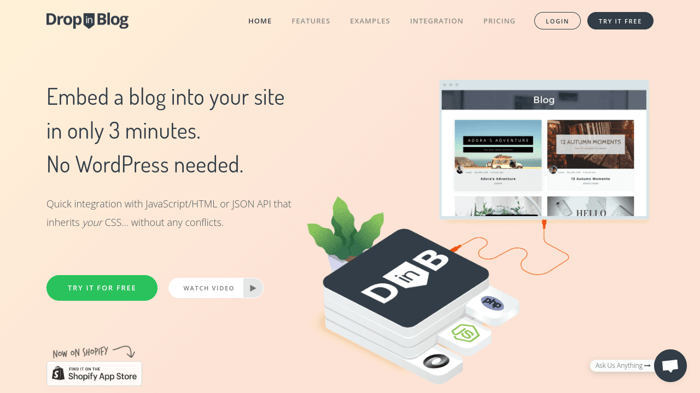
- What’s my budget?
Those just starting out might not have a big budget to play with. However, consider the value for money and ensure that your chosen platform gives you all the features and functionality you need with the price tag. Otherwise, you might end up paying more to add on functionality.
- What skills do I have in web development?
If you can’t code, don’t subscribe to a platform that requires coding skills to make even the smallest of changes. It might be a brilliant blogging platform with loads of functionality and growth potential, but if you can’t use it – it’s not brilliant.
Get the Domain Name Right
Get your domain name just right, and it will play a crucial part in your brand. The best domain names:
- Are simple and not too long.
- Are catchy and easily memorable.
- Include keywords or your existing brand name.
- Don’t use numbers or hyphens (although sometimes numbers work).
It’s important you get it right because once you’ve registered your domain name, you can’t change it without migrating your blog.
Analyze Your Traffic
Once your blog is set up and your content strategy firmly in place, you also need to establish metrics to monitor and analyze traffic. Analyzing your blog traffic is important to gauge ROI. It will also help you understand how valuable your content is by looking at the bounce rate, time on page, inbound links, comments, and shares on social media.
This is also linked to your website's core web vitals score. Google uses this to help rank websites. Core web vitals scores are developed based on factors related to website speed and stability.
Analyzing blog traffic will help you improve future content and increase readership.
Content and Consistency
When you start publishing content, make sure you always align with your original content strategy. Develop a post schedule and keep publishing consistently. Consistency is key, but so is quality.
Utilize writing and SEO tools to help you produce high-quality content that will be ranked well by search engines. Developing blog topics and doing keyword research will rely on several different tools, and this is an essential background element to every blog post.
You’ll also be wise to integrate an SEO tool to make life much easier when it comes to optimizing your content; unless, of course, you’re using DropInBlog, which has a built-in SEO Analyzer to guide you to an optimal SEO score.
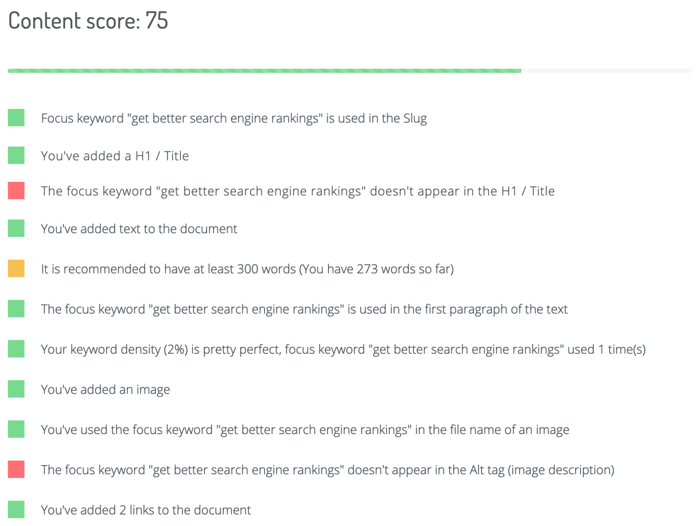
Overall, your content needs to be aimed at engaging your readers and encouraging interaction, like sharing posts on social media. If your blog is aiming to boost sales, then you’ll want to directly link shoppable products into your blog posts.
FAQs
What are some common mistakes to avoid when starting a business blog?
The most common mistakes that lead a business blog to fail in achieving its goals are simply down to poor planning. Not accurately defining the target audience and not developing a content strategy will mean you put a lot of time and effort in for nothing. To reiterate, you need to:
- Lay the groundwork and establish goals.
- Choose the right platform for you.
- Settle on a fitting domain name.
- Analyze, analyze, analyze.
- Keep your content consistent and pay attention to SEO.
How do I choose a blogging platform for my business?
The platform you choose will ultimately revolve around the following three aspects:
- Your web development skills
- How much time you have to invest in the blog
- Your budget
Those with limited time to invest, little to no technical skills in web development, but a reasonable budget might be happy to engage a developer. However, it’s likely the majority will not fall into this category. Typically, people opt for a platform that’s easy for people with limited skills to use, affordable, and fully-featured, like DropInBlog.
How important is having a blog for my business?
In today’s digital world, ranking well on search engines and getting seen is crucial to doing business. Companies that blog, on average, produce is 67% more leads each month than those that don’t. Not to mention it’s a cheaper form of marketing and generally leads to higher conversions.
Final Thoughts
Starting a blog for your business is a worthwhile investment. Not only will it boost your SEO and help you become more visible online, but it will foster a relationship with your customers that no paid ad campaign can do. The best part is businesses with blogs often see higher conversion rates.
However, getting the setup and initial phases right are important to ensure your blog hits the ground running. Do spend the time planning a content strategy, choose your blogging platform wisely, and devise a winning domain name.
Don’t drop the ball there – you definitely need to analyze your traffic because this will help keep you on top and improving. Once you’ve locked down all those elements, all that’s left is to produce quality content regularly.


